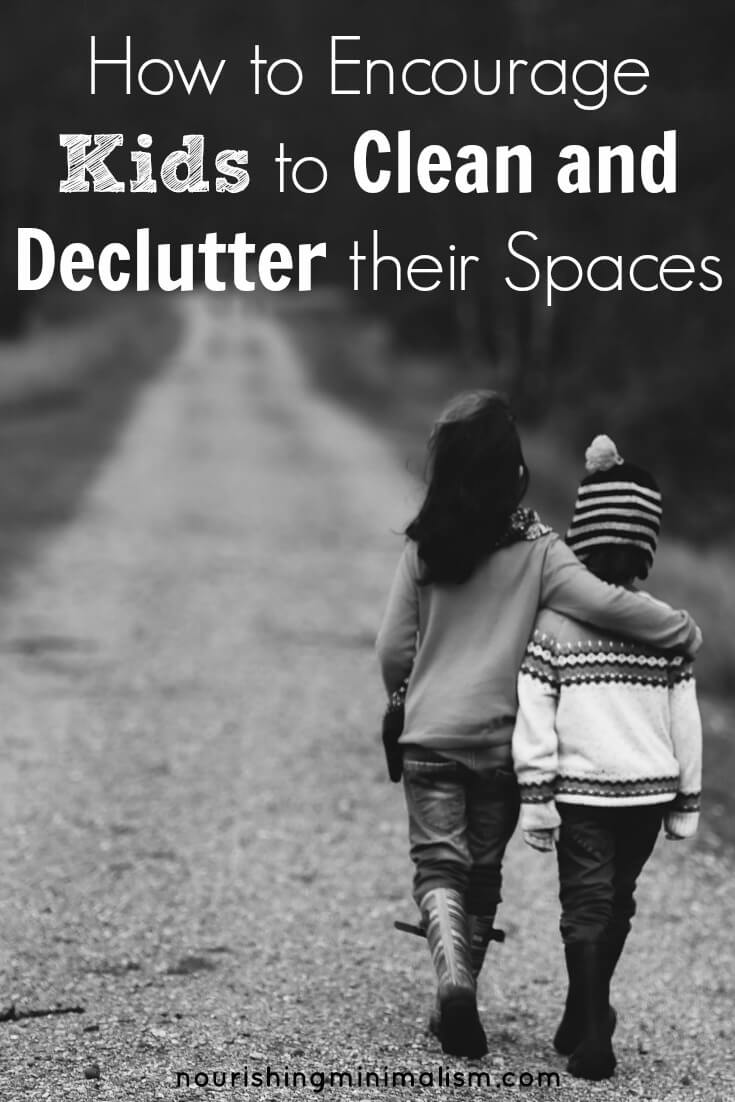How to Encourage Kids to Clean and Declutter their Spaces

Often times, one of the most frustrating aspects of becoming minimalist is the overwhelming desire for the rest of the family to come on board. Yesterday.
But the last thing you want is for it to become a battle; the reason you’ve embraced minimalism is for the peace it will bring, right?
Try as you might, you can’t force your husband to declutter, but what about the kids?
- How can you get the kids to declutter and clean their spaces without it turning into a battle?
- How can you foster healthy decluttering attitudes?
You certainly don’t want them to grow up feeling the need to save everything because you chucked all their favorite things without their input. On the other hand, you’re the parent. Too much stuff is too much stuff. It’s your home and your job to take the lead.
When they’re little, it’s easy. Their special things are obvious: the favored blanket or stuffed animal; the things you would be searching every nook and cranny in the house to find if it was ever missing. The rest can go if you wish, and chances are they’ll never notice.
With older kids, it becomes more important to have their input. It really depends on the age and personality how much of a challenge you have on your hands.
Here are six general strategies you can use to help motivate kids to declutter, clean, and “own” their spaces and to foster a positive, lifelong relationship with stuff:
#1 Lead by example
This may be the most important one of all. Our kids generally mimic our behaviors. How often have you heard them say something, only to cringe, because you realize they sound exactly like you? And most of the time, it isn’t pretty, is it?
However, when we model positive behaviors, they pick that up too.”Monkey see; monkey do” is a saying for a reason. If they see us letting go of broken items instead of having piles of things to fix “someday” (only they never get fixed) or donating an item we’re no longer using to a charity, they’re likely to learn those behaviors.
If they see you decluttering and maintaining routines, then that becomes the norm.
#2 Help them to see the vision/the why
The ultimate goal is for them to understand the reason why you’re decluttering and the vision for what’s possible with a clean and clear home. It helps for them to know how it will benefit them.
Things such as:
- Less stuff means they’ll be able to clean their room fast
- Friends will be able to come over more often
- There will be more time for fun activities like swimming or going to the park
- Being able to find what you need when you need it
- A clear space to work on their favorite project or play their favorite game
- To be able to give to others in need
- For teens, not showing up to school a wrinkled mess
#3 Help them to develop their own decluttering/cleaning routines
Helping them to establish routines teaches them habits that will last a lifetime and will keep their space from ending up an overwhelming mess.
Starting small sets them up for success. For example, simply making the bed each morning when they get up is a great habit to start with.
From there, you can build up their routine. Maybe pick a certain time of day they put up their clean clothes and pick up their toys. Or a certain day they are responsible for “deeper” cleaning in their area.
Before a birthday or Christmas is a great time to have a routine decluttering session. Or teach them simple decluttering rules, such as “one thing in-two things out.”
#4 Give them specific tasks
If the room is a disaster, and piled with too much stuff, telling them to just “go clean your room” probably won’t get the best results. Many kids become overwhelmed.
Remember how often you’ve been overwhelmed by stuff in the past?
You’ll likely find everything under the bed or shoved in the closet.
Specific directions make it clear what you expect from them. With time and practice, they’ll know what to do.
For example, instead of “go clean your room,” try:
- Make your bed
- Put your dirty clothes in the hamper
- Hang up your shirts
- Find five toys you would like to donate
- Dust your shelves
Breaking it into smaller pieces makes it much more manageable for them.
#5 Work alongside them and teach them how
Some are more prone to organization than others, but generally speaking, kids aren’t born knowing how to clean and manage stuff.They need to be shown how to do a job, to be encouraged as they’re learning, and to be assisted with the process.
It will certainly not be “good enough” in the beginning, but they need to be recognized for their efforts, and their skills will build over time. The outcome will be worth the patience you show.
#6 Give them something to look forward to when they’re done
It doesn’t have to be some huge reward. Just something motivating and something to look forward to. Who doesn’t like to be recognized for their hard work?
Maybe when they’re finished, it will be time for dessert or time to play a family game. Maybe you will go to the playground sometime during the week. If it’s a big job, maybe the family goes to a movie or out for ice cream. Whatever your kids enjoy.
More helps:
- How To Get The Kids On Board With Decluttering The Toys
- Decluttering the House (Even When the Children are Running Around)
- Inspiration and Decluttering Articles for the Overwhelmed Moms
Free Decluttering Chart!

Join over 41,517 subscribers and participate in the Yearly Decluttering Challenge: Declutter 2022 Items in 2022!


I find that kids are more cooperative if you make it fun for them. also, they are very open to the lessons if you teach it to them, It is nice to instill the value of minimalism or decluttering at such a young age so that they will not be living their lives in the grasp of material things.
Thank you, I’m going to try these idea on my 14 year old. He did his fair share of chores up until about 11 and since then it has indeed been a battle and I usually end up doing things myself for a quiet life!
cASTING VISION HAS BEEN SUPER HELPFUL FOR ME! i USED TO TAKE EVERY FREE THING i COULD (SIDE OF THE ROAD, YARD SALE, ETC). nOW MY SEVEN YEAR OLD IS THE ONE WHO TELLS ME TO KEEP DRIVING: WE DON’T NEED ANY MORE STUFF MOM! oNE OTHER THING iVE FOUND HELPFUL IS TO give them each a bin for all their “Special” things. One of our FOUR IS PARTICULARLY SENTIMENTAL. gIVING STUFF UP IS HARD FOR HER. i WANT TO ALLOW FOR THIS TO SOME DEGREE BUT ALSO SET BOUNDARIES. sO WE GIVE THEM EACH A BIN (THE SIZE OF AN IKEA kALLAX CUBE). wHEN ITS FULL, THEY NEED TO GO THROUGH IT AND CHOOSE WHAT TO KEEP AND WHAT TO DISCARD.
These are awesome tips, Rachel. Thanks so much. A couple of years ago I remember I wanted my son to get rid of most of his McDonald’s toys which had accumulated over the years. He through like 4 or 5 things away and insisted on keeping the rest. This time I tried a different tactic. I gave him the box and told him that he could pick 2 items to keep which he did without even complaining. I was very proud of both of us. lol
That’s wonderful Yvonne!!